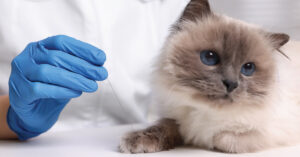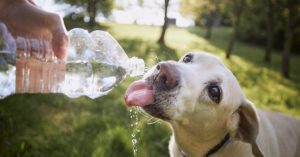Our pets are more than just companions; they’re beloved members of our families. As responsible pet owners, we ought to ensure their health and well-being in every way possible. While we often focus on their nutrition, exercise, and general health, one aspect that sometimes goes overlooked is their dental health. Like humans, good oral hygiene is vital for our furry friends. In this comprehensive guide, we’ll explore the importance of pet dental care, including brushing techniques, regular dental check-ups, and the profound impact of oral health on their overall well-being.
Sings of Dental Disease – What to Look Out For
Contact us to schedule an exam if you notice any of the following in your furry friends:
- Chattering teeth
- Blood in their mouth
- Discoloration of the teeth
- Red and/or inflamed gums
- A strange odor
- A change in eating patterns
- Low energy
Dental Work
On the day of your pet’s anesthetic dental procedure, your furry friend will be anesthetized, and a registered veterinary technician (RVT) will conduct a series of essential tasks. This includes dental x-rays, thorough scaling, polishing, and a comprehensive oral examination. Based on their meticulous assessment and dental x-ray results, the veterinarian will identify which teeth require extraction. Following this evaluation, the RVT will contact you with an updated cost estimate and present the best plan for your pet’s oral health. Once you provide your approval, the RVT will proceed with the dental procedure.
Anesthesia allows our team to perform a comprehensive examination of your pet’s mouth, making it easier to identify any additional diseased teeth. Some dental issues may only become apparent during the extraction procedure itself. Please be aware that our dental estimates are formulated with the best approximation, as we cannot fully examine your pet’s teeth without anesthesia. We aim to keep our clients well-informed and may inform you that further dental work could be necessary.
Aftercare
Following the completion of the procedure, our team will closely monitor your pet as they wake up. Please anticipate that your pet will remain with us for most of the day. Upon picking up your pet, you will receive prescribed medications and a take-home dentistry instruction packet. This packet will contain a comprehensive summary of aftercare instructions tailored specifically to your pet by our team.
The initial 24-48 hours post-surgery may pose the most significant challenges as your pet recovers from anesthesia. During this period, we recommend providing wet or moistened food for 7-10 days. After a couple of days, your pet should show signs of improvement and return to their usual routine. We often hear how pets thrive after the removal of diseased teeth. If your pet has had most of its teeth extracted, there’s no need to worry! They can still enjoy hard kibble, engage in regular play, and partake in all the activities typical of a pet with teeth.
Price
The cost of dental surgery for your pet can fluctuate based on the complexity of the procedure and the number of teeth that need extraction. Our priority is to provide you with the most accurate and comprehensive estimate possible.
Laguna Beach Veterinary Medical Center is proud to boast a team of highly trained and experienced professionals who are well-equipped to address a wide range of dental issues. Our registered veterinary technicians (RVTs) are particularly passionate about dental health and are available to address any questions or concerns you may have.
The Neglected Aspect: Pet Dental Health
Dental issues in pets are a common yet underestimated concern. Dental disease can affect cats and dogs of all ages and breeds. It’s estimated that by age three, most dogs and cats have one or another form of dental disease. So, why is dental health so vital for our pets?
1. Pain Prevention
Imagine enduring chronic toothaches without any relief in sight. That’s what pets with dental issues might be experiencing. Dental diseases like gingivitis and periodontitis can be excruciating for our furry companions. By addressing these problems early, we can prevent unnecessary suffering.
2. Overall Well-Being
The health of your pet’s teeth and gums plays a critical role in their overall health and well-being. Neglected dental problems can result in infections that might extend to vital organs, such as the heart, liver, and kidneys. Therefore, ensuring excellent dental health is imperative for averting severe health complications.
The Dental Care Routine
Now that we’ve recognized the significance of dental health for our pets, let’s delve into effective ways to uphold it.
1. Brushing Techniques
Brushing your pet’s teeth is one of the most successful ways to prevent dental problems. Here’s how to get started:
– Choose the Right Tools: Purchase a pet-specific toothbrush and toothpaste. Human toothpaste can harm pets, so opt for products made for them.
– Gradual Introduction: Begin by gently massaging your pet’s gums with your finger. Gradually introduce them to the toothbrush by letting them lick the toothpaste off it.
– Short Sessions: Start your brushing sessions with short intervals, typically ranging from 30 seconds to a minute, and progressively lengthen the duration as your pet becomes increasingly comfortable with the process.
– Be Patient: Not all pets will warm up to having their teeth brushed right away. Be patient and use positive reinforcement to make the experience enjoyable.
2. Regular Dental Check-Ups
Just like with humans, regular dental check-ups are crucial for pets. Your veterinarian can identify dental issues early and recommend appropriate treatment. They may also perform professional cleanings under anesthesia, significantly improving your pet’s oral health.
3. Dental-Friendly Diet
Consider feeding your pet a diet formulated to promote dental health. Pet foods formulated for dental health typically feature kibble with a size and texture that aids in minimizing plaque and tartar accumulation. Additionally, dental chews and chew toys designed to encourage chewing can also play a role in maintaining oral
The Impact of Good Oral Health
The benefits of maintaining your pet’s oral health extend beyond just preventing dental problems.
1. Fresh Breath
Let’s face it; bad breath in pets can be pretty unpleasant. Regular dental care can keep your pet’s breath fresh, making those cuddle sessions more enjoyable.
2. Prolonged Lifespan
Good oral health can lead to your pet’s longer, healthier life. Preventing dental diseases reduces the risk of related complications and ensures a higher quality of life.
3. Enhanced Well-Being
A pet with healthy teeth and gums is generally happier and more comfortable. Their ability to eat, play, and enjoy life significantly improves when oral health is maintained.
If you observe any signs of dental disease in your pet, the next step is to schedule a dental examination. One of our veterinarians will evaluate your pet’s teeth and create a customized health plan based on the severity of their dental issues.
We provide two types of dental cleanings: an anesthetic dental and a non-anesthetic dental. Like a visit to the dentist for humans, a non-anesthetic (or “awake”) dental cleaning is carried out while your pet is awake or under mild sedation. However, if any oral pathology is detected, such as a broken tooth, pocketing, or a loose tooth, we strongly recommend an anesthetic dental cleaning. In the unfortunate event that your pet does not cooperate during a non-anesthetic dental cleaning, we may recommend switching to an anesthetic dental procedure for their safety and thorough treatment.
Conclusion
As responsible pet owners, we must prioritize every aspect of our pets’ well-being, including their dental health. Understanding the importance of good oral hygiene, implementing proper brushing techniques, scheduling regular dental check-ups, and considering dental-friendly diets can ensure our furry companions enjoy a pain-free and joyful life. Remember, a smile says it all, and with the proper dental care, your pet’s smile will radiate happiness and health for years to come.
At the Laguna Beach Veterinary Medical Center, our veterinarians specialize in integrative medicine, combining both holistic and conventional treatment methods to ensure your pet receives comprehensive care. With certification and training in traditional and advanced holistic veterinary practices, our professionals deliver compassionate and unique healing techniques.
Call (949) 464-1000 to schedule an appointment with Dr. Cohen or Dr. Kruger today.


